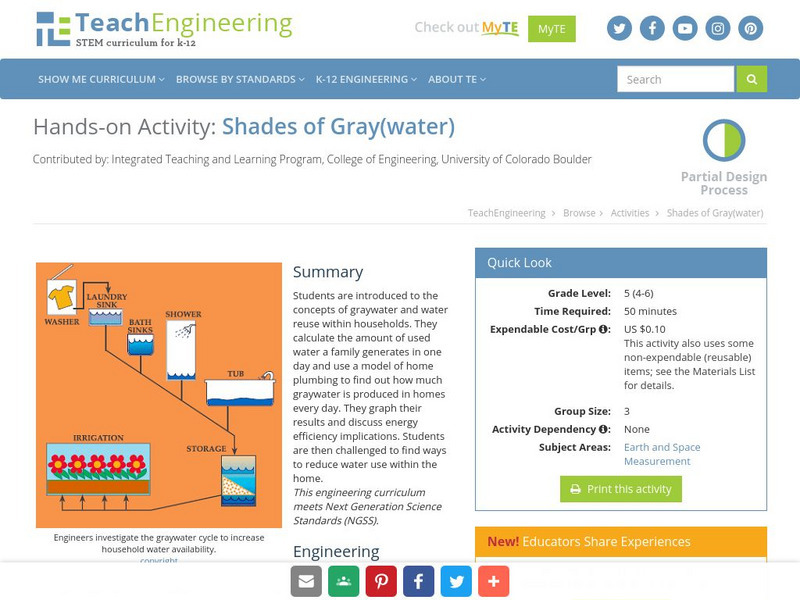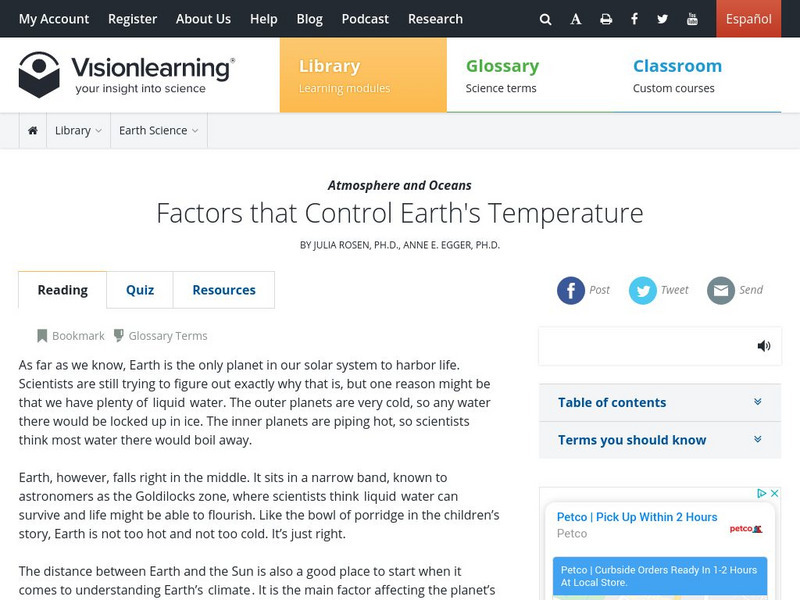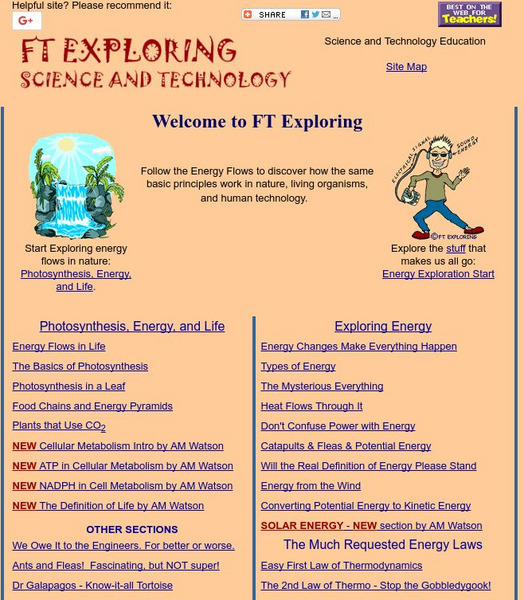National Institute of Standards and Technology (NIST)
Thermophysical Properties of Fluid Systems
At this site, the student can find out thermophysical properties of different fluids and gases.
Georgia Department of Education
Ga Virtual Learning: Biology: Ecology I
A comprehensive ecology learning module where students assess the dependence of all organisms on one another and the flow of energy and matter within their ecosystems.
Shmoop University
Shmoop: Ecosystem Energy Flow
Explains the processes by which energy flows through an ecosystem. Covers the meanings of key vocabulary, e.g., types of producers and consumers, trophic levels, food webs, and the energy pyramid.
Science Struck
Science Struck: Tropical Rainforest Energy Pyramid and Its Importance
Explains the roles of consumers, producers, and detrivores or decomposers and how energy flows through the different levels of the energy pyramid of a tropical rainforest.
Science Buddies
Science Buddies: Leaky Clues to Dam Design: How Reservoir Height Affects Hydroel
It's hard to believe that the same water that you use every day to quench your thirst, cook with, bathe in, swim in, and wash your clothes and dishes, is capable of another trick-it can make electricity. Electricity can be generated...
Other
Seeds Foundation: Hydroelectricity
Have you ever tried to walk across a flowing stream? Have you ever watched a news report that showed cars and bridges being washed away by a flood? These experiences and events suggest the force of moving water, which provides a...
Georgia State University
Georgia State University: Hyper Physics: Heat Pump
Heat flow from a hot region to a cold region is described and explained. Applications of this phenomenon (specifically heat pumps and refrigerators) are discussed. Excellent graphics.
TryEngineering
Try Engineering: Flashlights and Batteries
Learners work in teams to explore how a flashlight works. This activity examines the topics of batteries, electron flow, circuit systems, switches, and bulbs.
ClassFlow
Class Flow: Sources of Energy
[Free Registration/Login Required] In this flipchart, students are introduced to the different sources of energy produced on earth. Students will learn the names of different energy sources, the mechanisms of how each works along with...
ClassFlow
Class Flow: Energy Test Review
[Free Registration/Login Required] This flipchart is a review of energy sources and their uses.
ClassFlow
Class Flow: Energy
[Free Registration/Login Required] The teacher will use this lesson plan flipchart to review the concept of energy.
ClassFlow
Class Flow: Global Warming
[Free Registration/Login Required] A flipchart that provides information about global warming, and the issues associated with green energy production and usage.
ClassFlow
Class Flow: Cellular Respiration
[Free Registration/Login Required] This is a comprehensive, engaging overview of catabolic pathways that yield energy by oxidizing organic fuel. Students explore redox reactions, oxidation, reduction, and preview the stages of cellular...
Texas Education Agency
Texas Gateway: Food Chains, Food Webs and Food Pyramids
The following is a tutorial of food chains, food webs and food pyramids.
Concord Consortium
Concord Consortium: Stem Resources: Electric Current
In this interactive, students can explore how current, voltage, and resistance are related in a model showing the flow of electrons in an electric circuit. They will learn about Ohm's law and how other forms of energy can be made from...
TeachEngineering
Teach Engineering: Shades of Gray(water)
Students are introduced to the concepts of graywater and water reuse within households. They calculate the amount of used water a family generates in one day and use a model of home plumbing to find out how much graywater is produced in...
SMART Technologies
Smart: Energy Flow in an Ecosystem
Students learn about Abiotic and Biotic Factors and how they affect the ecosystem in which an animal might live in.
Massachusetts Institute of Technology
Mit: Open Course Ware: Courses: Civil Environmental: Ecology I: The Earth System
College-level online course highlighting the fundamentals of ecology. Course topics include coevolution of the biosphere, geosphere, atmosphere, and hydrosphere; photosynthesis and respiration; and the carbon, nitrogen, and water cycles....
Texas Education Agency
Texas Gateway: Organism Relationships: Food Chains, Webs, Pyramids
Given illustrations, students will analyze the flow of matter and energy in food chains, food webs, and ecological pyramids.
Vision Learning
Visionlearning: Atmosphere and Oceans: Factors That Control Earth's Temperature
An explanation of how temperature is affected by the composition of the atmosphere and how energy flows in and out of Earth's atmosphere.
TeachEngineering
Teach Engineering: What Is the Best Insulator: Air, Styrofoam, Foil, or Cotton?
That heat flows from hot to cold is an unfortunate truth of life. People have put a lot of effort into stopping this fact, however all they have been able to do is slow the process. Working in groups of three to four, students will...
TeachEngineering
Teach Engineering: Electrifying the World
This lesson introduces students to the fundamental concepts of electricity. This is accomplished by addressing questions such as "How is electricity generated," and "How is it used in every-day life?" The lesson also includes...
FT Exploring
Ft Exploring: Science and Technology Education
A very comprehensive site for teachers and students. Topics include bugs, energy, bones, animals, photosynthesis, energy, and technology.
Other
The Sustainable Scale Project: Ecological Footprint
The Ecological Footprint is rooted in the fact that all renewable resources come from the earth. It accounts for the flows of energy and matter to and from any defined economy and converts these into the corresponding land/water area...
Other popular searches
- Energy Flow
- Energy Flow in Ecosystems
- Ecosystem Energy Flow
- Energy Flow Energy Pyramid
- Energy Conversion Flow Chart
- Energy Flow Charts
- Energy Flow Diagram
- Ecology, Energy Flow
- Energy Flow Chart Diagrams
- Ecology Energy Flow
- Energy Flow in an Ecosystem
- Energy Flow in Ecology























